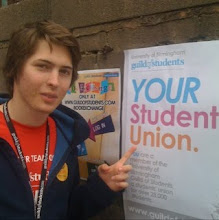The summer highlight for many Sabbatical Officers across the country is Active Political Leadership (APL), an NUS training course, that is meant to not only provide you with invaluable skills for the year in office but also to challenge your views on education and the role of student unions. In total there were around 25 sessions ranging from tutor groups to workshops and lectures. The training consists of courses on theoretical leadership and teamwork; workshops on campaigning and dealing with the media; and a simulation event called 'Fibchester' to round off the event.
While I could go into lots of detail regarding many of these sessions (i.e. the difference between political and administrative rationality, the public sphere etc.) I want to reflect on three experiences that reinforced my beliefs in what we, as elected Guild Officers, are here to do. In 1974, then NUS President Digby Jacks asserted that:
“Representation must never be seen, except in
strategic and practical terms, as an end in itself.
Too many union officers see it as a question of
communication and merely sitting on the
appropriate committee.
The purpose of representation is to secure
educational and social change”
So, in a nutshell everything we do, should, in some shape or form, be part of a quest for positive change that will affect not only our members but wider society. Acknowledging this as the rationale of student representation is the first step to being effective as a collective student movement. The problem we are trying to tackle was highlighted by two excellent presentations entitled Why Politics? A tale of two Cities and Education, Diversity and Ideology. The presentations, through a narrative based on statistical enquiry, challenged my perceptions regarding education, class and social solidarity. I do not want to go into too much detail because I could never do justice to the presentations but suffice to say that we seem to have forgotten the link between education and social wellbeing. Education, from infant over primary to secondary, tertiary and lifelong learning is not only the recipe for personal welfare but also the foundation for a progressive society.
What? I don’t care how cheesy it sounds but education is the key to a better society. You probably have heard that today a record number of young people received A-level results that we can all be proud of. University will, nonetheless, not be on the cards for many of them. The academic year ahead will be crucial for the student movement, not only because we are uniting to stand against any increase in tuition fees in order to give as many people access to learning as possible but more importantly because we need to fight to change the culture our society has towards education. Only if we remember that education is more than just a means to an end, we can start to tackle the wider problems in society such as poverty. People should not be having debates on dumbing-down or whether some courses are mickey-mouse. Rather people should be having debates as to how education can benefit society and why it matters now more than ever. Let’s use this year to getting one step closer to securing that change.


Any figures yet on how many clearing places Birmingham had this year? and how it compares to last year?
ReplyDeleteYou have a mention in the latest blog!
unofficialguild.blogspot.com
According to news sources there were 50 places. I don't have last years figures at hand but I'll find out and will report back.
ReplyDeleteEd (VPHC) blogged about this:
http://edsparkesvphc.blogspot.com/2009/08/levels-and-national-tragedy.html
see also: http://news.bbc.co.uk/1/hi/education/8213631.stm
btw @unofficialguild: I tried to get Ed to explain test cricket to me... Not convinced. But we have had bbqs!